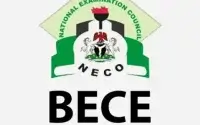First Term Examination Questions History JSS 3 First Term Lesson Notes Week 13
First Term Examination – History JSS 3
Week 13: Examination of First Term Topics
Exam Instructions
For Teachers:
- Ensure all students receive the correct exam papers.
- Emphasize academic honesty and warn against malpractice.
- Monitor the exam hall closely to prevent cheating.
- Allow only permitted materials during the exam.
- Provide clear instructions and assist with any questions.
For Students:
- Read all instructions carefully before starting.
- Do not talk or communicate with others during the exam.
- Use only materials allowed for the exam.
- Avoid looking at others’ papers.
- Raise your hand if you have any questions or need assistance.
Part A: Objective Questions
- The Trans-Saharan trade connected West Africa with __________.
a) Asia
b) Europe
c) North Africa
d) South Africa - The Portuguese first contacted the Benin Empire in __________.
a) 1485
b) 1500
c) 1600
d) 1800 - One of the major commodities exchanged in the Trans-Saharan trade was __________.
a) Diamonds
b) Salt
c) Cocoa
d) Cotton - Islam was spread in West Africa primarily through __________.
a) War
b) Trade
c) Farming
d) Migration - The Sokoto Caliphate spread __________ across northern Nigeria.
a) Christianity
b) Islam
c) Judaism
d) Buddhism - Timbuktu was a major center for __________ in West Africa.
a) Tourism
b) Trade and education
c) Farming
d) Military training - Mary Slessor is remembered for her efforts to stop the killing of __________.
a) Orphans
b) Twins
c) Animals
d) Slaves - The __________ Ocean was used by Europeans for trade with West Africa.
a) Pacific
b) Atlantic
c) Indian
d) Arctic - __________ introduced Christianity to Badagry in 1842.
a) Mary Slessor
b) Henry Townsend
c) Ajayi Crowther
d) Mungo Park - Gold and salt were transported across the __________ desert.
a) Sahara
b) Kalahari
c) Namib
d) Gobi - The Sokoto Caliphate was established by __________.
a) Mary Slessor
b) Usman Dan Fodio
c) Ajayi Crowther
d) Mungo Park - Early European explorers came to Africa mainly for __________.
a) Hunting
b) Trade and exploration
c) Farming
d) Tourism - Christianity was spread in Nigeria through the efforts of __________ missionaries.
a) African
b) European
c) Asian
d) Arab - The Atlantic slave trade was also known as the __________ trade.
a) Silk
b) Illegitimate
c) Legitimate
d) Palm oil - The Trans-Saharan trade involved North Africa and __________.
a) West Africa
b) East Africa
c) South Africa
d) Central Africa - __________ was an important missionary who worked among the Efik people.
a) Mary Slessor
b) Henry Townsend
c) Ajayi Crowther
d) Samuel Ajayi - Ajayi Crowther was the first African bishop of the __________ church.
a) Catholic
b) Anglican
c) Methodist
d) Baptist - The trade in palm oil began after the abolition of the __________ trade.
a) Slave
b) Gold
c) Salt
d) Iron - Mungo Park explored the course of the __________ River.
a) Niger
b) Nile
c) Congo
d) Zambezi - Christianity was introduced to the Benin Empire by missionaries from __________.
a) Portugal
b) Spain
c) Britain
d) France - The British used the __________ system to govern Nigeria.
a) Military
b) Indirect rule
c) Direct rule
d) Democratic - The Trans-Atlantic slave trade was abolished in the __________ century.
a) 17th
b) 18th
c) 19th
d) 20th - Early missionaries in Nigeria introduced __________ language.
a) Arabic
b) English
c) French
d) German - Timbuktu was located in present-day __________.
a) Nigeria
b) Mali
c) Ghana
d) Senegal - The Portuguese explorers first landed at the __________ coast of Nigeria.
a) Lagos
b) Calabar
c) Benin
d) Warri - The Atlantic slave trade involved the export of slaves from Africa to __________.
a) Europe
b) Asia
c) America
d) Australia - __________ was a key center for palm oil trade in Nigeria.
a) Calabar
b) Kano
c) Zaria
d) Sokoto - Islam was introduced to West Africa through __________ merchants.
a) Portuguese
b) Arab
c) British
d) Indian - The Portuguese explorers brought __________ to the Benin Empire.
a) Christianity
b) Islam
c) Buddhism
d) Hinduism - __________ was known for translating the Bible into Yoruba.
a) Ajayi Crowther
b) Henry Townsend
c) Samuel Ajayi
d) Mary Slessor
Part B: Theory Questions
- Name two commodities traded across the Sahara.
- What was the main reason for early European exploration in Africa?
- Describe the role of the Sokoto Caliphate in spreading Islam.
- How did trade contribute to the spread of Islam in West Africa?
- Name the first European country to establish contact with the Benin Empire.
- Who was the first African bishop of the Anglican Church?
- What was the significance of Timbuktu in West African history?
- Why was salt important in the Trans-Saharan trade?
- Who stopped the killing of twins in Nigeria?
- What was the main reason for the abolition of the Atlantic slave trade?
Part C: True or False
- Islam spread in West Africa through trade. (True)
- Christianity was first introduced to Nigeria by Arab traders. (False)
- The Sokoto Caliphate spread Christianity across Nigeria. (False)
- Mary Slessor worked to stop the killing of twins. (True)
- The Atlantic slave trade is also known as the legitimate trade. (False)
- Mungo Park explored the River Niger. (True)
- Timbuktu was a military center. (False)
- Ajayi Crowther translated the Bible into Yoruba. (True)
Related
Related posts:
- The Journey of Faith: How Islam Spread Through Trade in West Africa History JSS 3 First Term Lesson Notes Week 5
- How the Trans-Saharan Trade Shaped West Africa and Nigeria History JSS 3 First Term Lesson Notes Week 4
- Exploring Connections: Early European Contact with West Africa and Nigeria History JSS 3 First Term Lesson Notes Week 8
- Early European Contact with Nigeria – Advent of Christianity in Nigeria History JSS 3 First Term Lesson Notes Week 10
- How Missionaries Shaped Nigeria’s Future History JSS 3 First Term Lesson Notes Week 11
Related Posts

PRINCIPLES OF PERSPECTIVE

Comprehensive Music and Dance Quiz: Test Your Knowledge with These Challenging Questions

JSS 3 FIRST TERM LESSON NOTES MATHEMATICS
About The Author
Edu Delight Tutors
Am a dedicated educator with a passion for learning and a keen interest in technology. I believe that technology can revolutionize education and am committed to creating an online hub of knowledge, inspiration, and growth for both educators and students. Welcome to Edu Delight Tutors, where learning knows no boundaries.